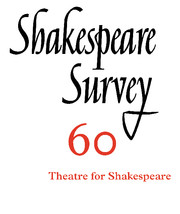Book contents
- Frontmatter
- Professional Players in the Guild Hall, Stratford-upon-Avon, 1568–1597
- Reconstructing The Rose: Development of the Playhouse Building between 1587 and 1592
- The Rose and its Stages
- Philip Henslowe and the Elizabethan Court
- From Revels to Revelation: Shakespeare and the Mask
- Bride-ing the Shrew: Costumes that Matter
- ‘When Men and Women are Alone’: Framing the Taming in India
- The Crown and the Pillow: Royal Properties in Henry IV
- Humanity at Stake: Man and Animal in Shakespeare’s Theatre
- Popular Shakespeare in Japan
- ‘Philosophy in a Gorilla Suit’: Do Shakespearians Perform or Just Perform-a-tive?
- Sudokothellophobia: Writing Hypertextually, Performatively
- Living Monuments: The Spatial Politics of Shakespeare’s Rome on the Contemporary Stage
- ‘In Windsor Forest and at the Boar’s Head’: The ‘Falstaff Plays’ and English Music in the Early Twentieth Century
- Michael Bogdanov in Conversation
- The Mouse and the Urn: Re-Visions of Shakespeare from Voltaire to Ducis
- ‘I covet your skull’: Death and Desire in Hamlet
- Martin Droeshout Redivivus: Reassessing the Folio Engraving of Shakespeare
- Canonizing Shakespeare: The Passionate Pilgrim, England’s Helicon and the Question of Authenticity
- Rereading Shakespeare: The Example of Richard Brathwait
- Shakespeare Performances in England, 2006: January 2006
- Professional Shakespeare Productions in the British Isles January–December 2005
- he Year's Contributions to Shakespearian Study 1 Critical Studies
- 2 Shakespeare in Performance
- 3 Editions and Textual Studies
- Index
Sudokothellophobia: Writing Hypertextually, Performatively
Published online by Cambridge University Press: 28 November 2007
- Frontmatter
- Professional Players in the Guild Hall, Stratford-upon-Avon, 1568–1597
- Reconstructing The Rose: Development of the Playhouse Building between 1587 and 1592
- The Rose and its Stages
- Philip Henslowe and the Elizabethan Court
- From Revels to Revelation: Shakespeare and the Mask
- Bride-ing the Shrew: Costumes that Matter
- ‘When Men and Women are Alone’: Framing the Taming in India
- The Crown and the Pillow: Royal Properties in Henry IV
- Humanity at Stake: Man and Animal in Shakespeare’s Theatre
- Popular Shakespeare in Japan
- ‘Philosophy in a Gorilla Suit’: Do Shakespearians Perform or Just Perform-a-tive?
- Sudokothellophobia: Writing Hypertextually, Performatively
- Living Monuments: The Spatial Politics of Shakespeare’s Rome on the Contemporary Stage
- ‘In Windsor Forest and at the Boar’s Head’: The ‘Falstaff Plays’ and English Music in the Early Twentieth Century
- Michael Bogdanov in Conversation
- The Mouse and the Urn: Re-Visions of Shakespeare from Voltaire to Ducis
- ‘I covet your skull’: Death and Desire in Hamlet
- Martin Droeshout Redivivus: Reassessing the Folio Engraving of Shakespeare
- Canonizing Shakespeare: The Passionate Pilgrim, England’s Helicon and the Question of Authenticity
- Rereading Shakespeare: The Example of Richard Brathwait
- Shakespeare Performances in England, 2006: January 2006
- Professional Shakespeare Productions in the British Isles January–December 2005
- he Year's Contributions to Shakespearian Study 1 Critical Studies
- 2 Shakespeare in Performance
- 3 Editions and Textual Studies
- Index
Summary
If you are an adventurous (or hypertextual, perhaps performative) reader I invite you to skip this introduction and go straight to the puzzle (you can always come back); what follows here is an orientation, a way into and around the main body of this article. If, as Umberto Eco writes, ‘A title must muddle the reader’s ideas, not regiment them’, then the next few pages aim to (slightly) un-muddle, though certainly not regiment, access to the puzzle through explanation of my title and method. I feel, at once, that I should apologize for this title and perhaps I would have abandoned the initial monstrosity altogether had its tripartite awkwardness not so neatly encapsulated the method. Writing about (Shakespearian) performance often involves such apologies, especially when the writing is deliberately methodological rather than descriptive of performance itself – I mean not writing about performance, but writing about writing about performance – and this is perhaps a tacit acknowledgement that writing cannot hope to reproduce a given production, neither its materiality nor ephemerality. Mike Pearson and Michael Shanks, to whom I will return, defend their discrete disciplines of theatre and archaeology with ‘Apologia’ before less apologetically and less obviously bringing them together into a fruitful interdisciplinary blend. Michael Dobson begins his reflection on ‘Writing about [Shakespearian] Performance’ most deferentially (which is not always the way he writes about Shakespearian performances): ‘I should apologize first of all for starting this chapter thus in the first person’ and then he further excuses the article, which is ‘purely personal’ and ‘very cursory and simplistic’; he also defends a title about which he feels uncomfortable. Broken down, my title reveals an attempt to create a form of writing which thickly describes Shakespearian production – in this case an adaptation of Othello I directed in 2003/4 called Othellophobia – and to weave together the most pressing textual and contextual concerns. Thus: the form of the writing is (post)structured by the number puzzle sudoku; the content is Shakespeare’s Othello – the text itself, its more recent production history and the way that my production shaped the play; and the analysis of the content, which is facilitated by the form, is represented by phobia, which signals my concern here with (sub)textual and cultural anxieties generated and sustained by the play in performance.
- Type
- Chapter
- Information
- Shakespeare Survey , pp. 154 - 169Publisher: Cambridge University PressPrint publication year: 2007



